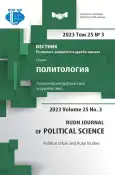The Rural Areas of the Krasnodar Region in the Context of Spatial Development Policy: A Socio-Demographic Aspect
- Authors: Rakachev V.N.1
-
Affiliations:
- Kuban State University
- Issue: Vol 25, No 3 (2023): Political Urban and Rural Studies
- Pages: 699-721
- Section: THE “DIFFICULT CHILD” OF POLITICAL SCIENCE: THE DISCOURSE OF RURALISTICS
- URL: https://journal-vniispk.ru/2313-1438/article/view/322222
- DOI: https://doi.org/10.22363/2313-1438-2023-25-3-699-721
- EDN: https://elibrary.ru/SABLGI
- ID: 322222
Cite item
Full Text
Abstract
The development of rural areas of the Krasnodar region has to be studied within the framework of the spatial development policies implemented at the federal and regional levels and the features of social and demographic processes in the rural population of the region. The author concludes about significant structural changes in the composition of the rural population of the Kuban, which, due to the inertia of demographic processes, are not yet so noticeable today, but in the future may become irreversible. The author also notes that the development of rural areas in the region, in the presence of several general trends, is characterized by heterogeneity, which requires the development and implementation of spatial development programs considering the characteristics of specific rural areas. In addition, it should be considered that the models used in the implementation of rural development policies should consider not so much the economic component of the village (sectoral model), but focus on the development, first of all, of human capital in the unique conditions of a particular territory (neo-endogenous and territorial models).
About the authors
Vadim N. Rakachev
Kuban State University
Author for correspondence.
Email: midav.sf@mail.ru
ORCID iD: 0000-0002-6505-4208
Doctor of Science in History, Professor of the Department of Sociology
Krasnodar, Russian FederationReferences
- Avdeev, Yu.A., Sidorkina, Z.I., & Ushakova, V.L. (2017). Territorial structure of the demographic potential of the Russian Far East. Living standards of the population of regions of Russia, (2), 16–22. https://doi.org/10.12737/article_590079df73e104.37232532 (In Russian).
- City and village in European Russia: One hundred years of changes (2001). Moscow: OGI (In Russian).
- Galyanov, I.V., Rezvyakov, A.V., & Studennikova, N.S. (2017). Demographic changes in rural territories of central Russia in the context of state social policy. National Interests: Priorities and Security, 13(2), 270–284. (In Russian).
- Glazer, O.B., & Weinberg, E.I. (2013). The space of life activity of the population and resettlement as factors and conditions for the modernization of Russia. Region: Economics and Sociology, 3(79), 21–38. (In Russian).
- Gorina, K.V. (2014). Demographic characteristics of the structures of urban and rural areas of the Trans-Baikal Territory. Scientific Bulletin of the Belgorod State University. Series: Natural Sciences, 26(3), 166–174. (In Russian).
- Knieling, J. (2018). Spatial development. Retrieved from https://nbn-resolving.org/ urn:nbn:de:0156-559917416
- Kostyaev, A.I. (2018). Conceptual approaches to the development of rural areas, taking into account the European experience. Agrarian science of the Euro-North-East, 6, 141–148. https://doi.org/10.30766/2072-9081.2018.67.6.141-148 (In Russian)
- Kostyaev, A.I., Kuznetsova, A.R., & Nikonov, A.G. (2020). Rural territories in the urban-rural settlement system: In the context of a spatial development strategy. International Agricultural Journal, 4(376), 19–23. https://doi.org/10.24411/2587-6740-2020-14064 (In Russian).
- Leontieva, L.S., & Smirnova, V.V. (2020). Quantitative evaluation of regional intangible resources potential (example of the Southern Federal District). Public Administration. Electronic Bulletin. 79, 229–245. https://doi.org/10.24411/2070-1381-2020-10057 (In Russian).
- Lowe, P., Murdoch, J., & Ward, N. (1995). Beyond endogenous and exogenous models: Networks in rural development. In Van der Ploeg J.D. & G. van Dijk (Eds.), Beyond modernization: The impact of endogenous rural development (pp.87–105). Van Gorcum: Assen.
- Mantino, F. (2010). Rural development in Europe: Politics, institutions and actors on the ground from the 1970s to the present day. Moscow: Business Media of the Sole 24 Ore (In Russian).
- Mikhalkina, E.V., & Kosolapova, N.A. (2018). Evaluation of the use of the potential of intangible resources of the region. Space of Economics. (1), 118–133. https://doi.org/10.23683/2073-6606-2018-16-1-118-133 (In Russian).
- Miroshnichenko, I.V., Morozova, E.V., Rakachev, V.N., & Samarkina, I.V. (2022). Non-material resources in the policy of development of rural territories: experience of conceptualization. Ethnos and society in the context of interethnic relations. Materials of the VIII All-Russian scientific-practical conference with international participation (pp.152–158). Krasnodar. (In Russian).
- Morozova, N.S., & Ivanova, E.V. (2015). Development of rural territories: Foreign experience. Socio-economic phenomena and processes, 10(6), 63–69. (In Russian).
- Motrich, E. (2016). Demographic situation in the Russian Far East: Main trends and challenges. Population, (1), 25–33. (In Russian).
- Ovchintseva, L.A. (2011). Russian policy of rural development in the context of European trends in the development of rural areas. Nikon readings, (16), 200–202. (In Russian).
- Petrikov, A., & Scribunova, N. (2003). Strategy for sustainable development in foreign countries. Agrarian reform. Economy and law. 3, 20–24. (In Russian).
- Ploeg, J.D., & Dijk, G. (eds.). (1995). Beyond modernization. The impact of endogenous rural development. Assen: Van Gorcum.
- Ploeg, J.D., Marsden, T., et al. (2008). Unfolding Webs: The Dynamics of Regional Rural Development. Assen, the Netherlands: Van Gorcum.
- Rakachev, V.N., & Morozova, E.V. (2022). Higher education as a resource for regional development policy: An example of the Krasnodar Territory. RUDN Journal of Political Science, 24(4), 827–855. https://doi.org/10.22363/2313-1438-2022-24-4-556-584 (In Russian).
- Rakachev, V.N., & Rakacheva, Ya.V. (2005). The population of the Kuban in the Twentieth century: A historical and demographic study. Vol. 1. Krasnodar (In Russian).
- Sukhoveeva, A.B., & Kalinina, I.V. (2018). Demographic situation in rural areas of the Jewish Autonomous Region and measures to improve it. Regional problems, 21(4), 85–92. https://doi.org/10.31433/1605-220X-2018-21-4-85-92 (In Russian).
- Vasilyeva, E.V., & Vasileva, A.V. (2022). Demographic research in the context of economic development and security of regions. Ekonomika regiona [Economy of regions], 18(1), 1–20, https://doi.org/10.17059/ekon.reg.2022-1-1 (In Russian).
- Ward, N., Atterton, J., Kim, T.Y., Lowe, P., Phillipson, J., & Thompson, N. (2005). Universities, the Knowledge Economy and Neo-Endogenous Rural Development. Centre for Rural Economy Discussion Paper Series.
- Zhukov, V.I. (2018). Sovereignty of Russia: National Interests, Demographic Threats and Challenges. RUDN Journal of Economics, 26(3), 335–346. https://doi.org/10.22363/23132329-2018-26-3-335-346 (In Russian).
Supplementary files









